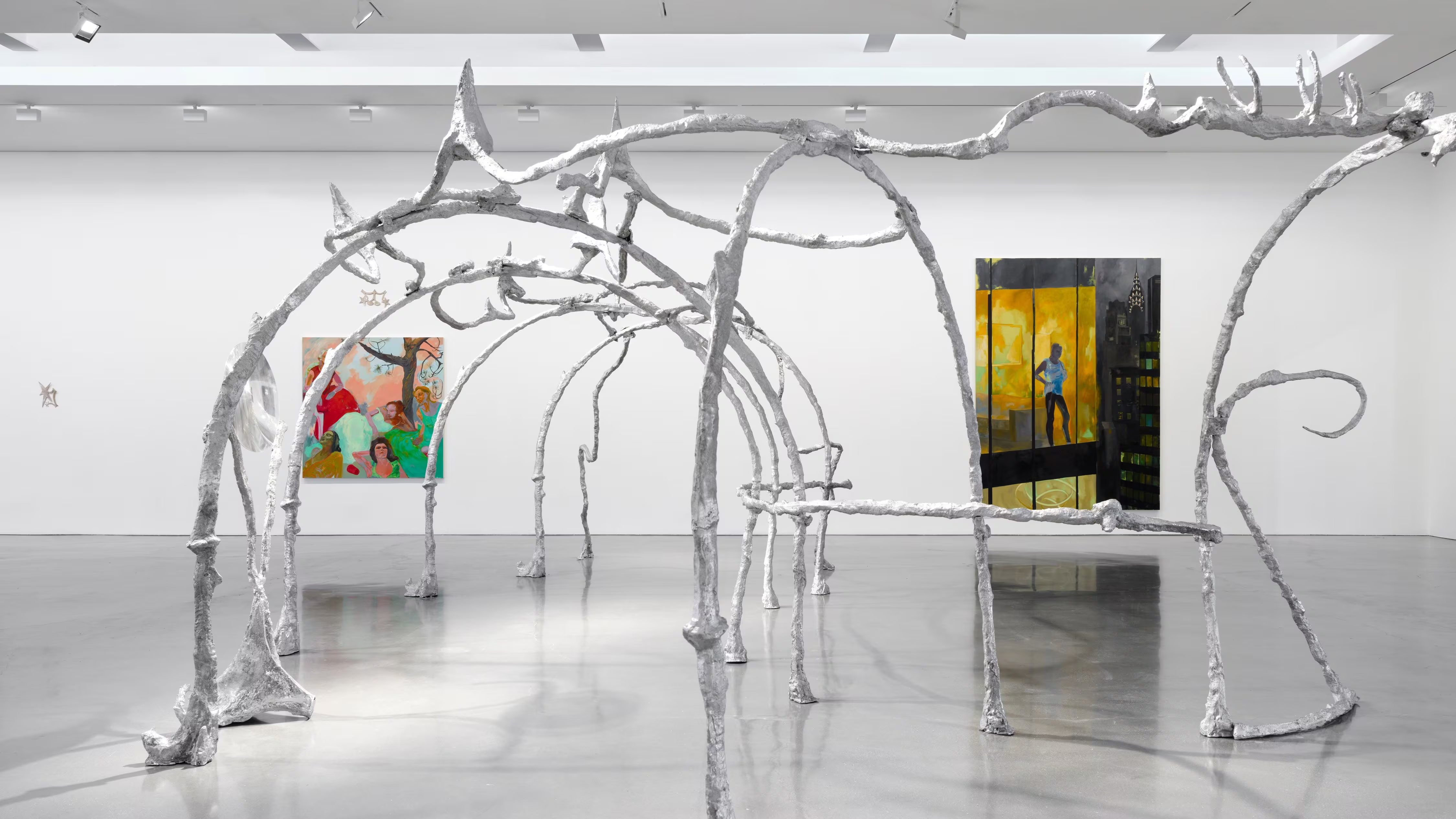
On the corner of Santa Monica Boulevard and Wilcox Avenue, surrounded by over a dozen performance venues, sits New Theater Hollywood. Nearly a year into its programming, what began as the art world’s best kept secret has gained a cult following in Los Angeles. Tonight, there is a palpable buzz in the chilly late autumn air. Clusters of people stand outside the entrance smoking cigarettes and mingling. Inside, its 50 red seats begin to fill up as the lights dim, while some latecomers gather on the stairs. The set is sparse: Two T.V. monitors downstage, four chairs arranged in a half circle in the back, and garments draped from a staircase, hinting at a life unseen. Suddenly, a live streamer Blessing appears, created and played by the London-based musician Klein. She has a frantic look in her eyes and is wearing a blood-stained shirt. Illuminated by a single spotlight, she shares a hidden truth she needs to get out. But no one will listen, she laments.
As the one-person show, titled Psalm's Trust (Vol. 2), progresses, Blessing apparates on the two T.V. screens before she is drowned out by other clips of documentaries made by Klein. At one point her mother (played by Bee-be Smith, New Theater Hollywood collaborator Jasmine Johnson’s actual mother) makes a cameo, emerging from a seat in the audience to deliver an arresting soliloquy. Besides this moment, Blessing is alone, tormented by her own urges in the spirit of the 1973 vampire film Ganja & Hess.

Hidden in the corners of the room, the theater’s co-founders Calla Henkel and Max Pitegoff are controlling the lights that frenetically keep up with the star as she navigates the darkness. Their duties as lighting operators mirror their roles within the theater writ large.
“As a simple form, theater is sort of like a prism to everyone's capabilities and desires,” says Henkel, who is an artist and writer herself. “Max and I can just set it up and let light shine through it.” Pitegoff, also an artist, agrees. There’s an immediacy to theater: “You can speak directly to the moment and speak directly to the people who you know will be there.” “You can't force a project like this,” adds Henkel. “You have to see who's attracted to it.”

In its first year, New Theater Hollywood has become a sort of third place for Los Angeles’ art, fashion, performance, and literary crowds. A notable feat considering the fragmented nature of a city where time in cars eclipses time on foot, and social gatherings often take place inside private homes. On any given night, an intergenerational mix of artists, writers, curators, and actors, many of whom are regulars, fill the often sold out shows. Performances range from tender meditations to puppet shows to angry rants to musical performances to impassioned monologues—sometimes confounding, sometimes shocking, always brimming with energy. At the heart of it all, a love for theater prevails.
What’s next? Two American Scenes, a sold out one-night-only play on November 24, directed by Stephanie Lacava and starring Tess Sahara and Jimmy Lux Fox alongside a cast that includes model Kaia Gerber, artist Collier Schorr, and musician Elias Rønnenfelt. Then from December 4 through 7, It’s My Sister, starring and written by the comedian Casey Jane Ellison and directed by Jos Howard Demme with costumes by Zoe Latta of Eckhaus Latta. As the theater continues to grow, the two welcome larger productions and creative freedom from their collaborators, while remaining true to their experimental roots.

The journey to this Los Angeles outpost began in Berlin, where Henkel and Pitegoff first began to experiment with their unique approach with the first iteration of New Theater after meeting earlier at Cooper Union in New York. “In Berlin, there was this openness to performance, and you didn't have to spend money the same way that you did in New York, which was a very liberating experience,” says Pitegoff. Some of their early projects included a dance troupe, adaptations of Greek plays, and performance art at punk squats in Berlin. Everything came into focus when they opened T.V. Bar, a weekend public space and weekday film set, cast with a mix of regulars and staff. The living art project led to their film series Paradise.
“We had this impulse and interest and it manifested in a very bizarre form,” says Henkel. “That is what community theater is: seeing yourself and seeing your loved ones presenting an alternative version of reality.” Adds Pitegoff: “We didn't record any of the performances. You had to be there.” After years of experimenting in Berlin, they set out to Los Angeles in search of their next project, drawn to the city where entertainment is industry, and the fringes are ripe for infiltrating. Plus, the winters are warm here, and the mountains stay green, no match for the cold Januaries of Berlin or even New York.
.avif)
The duo landed in LA in the summer of 2023 in hopes of creating another film, this time about a woman opening a theater. Their arrival coincided with the Hollywood strike, as artists and actors, facing a stalemate, had more free time and pent-up energy. “There was this hunger for something outside of the strictures of the industry,” recalls Petigoff. “When any industry collapses, people are excited about things on the edges again,” adds Henkel.
It was while they were location scouting that they came across their current address. A spark went off: “We are the people who are opening the theater,” says Henkel. “We didn't mean to make the film about us but that's what happened.” Pitegoff agrees, “It became the project that we had always wanted to do, with bits of footage from the real performances, rehearsals, and backstage, and then weave in this fictional element.” The duo plan on making what they describe as an ongoing film series for as long as the theater stays open.

In the year since the artist-run-space opened its doors to the public, it has built momentum with performances by Lily McMenamy, Ruby McCollister, Mykki Blanco, Klein, Colin Self, Diamond Stingily, Jasmine Johnson, and Karl Holmqvist, among others. With every production, there is a sense of discovery. “In theater, everyone is in the room, and we have to make this work in a week,” says Henkel. “It poses these creative challenges that are really exciting within a very strict world.”
After all, isn't that the point? To create a structure that invites such freedom and possibility, where artists call the shots—and fill the seats. As the saying goes: build it, and they will come. “It isn’t trying to promise too much,” says Henkel. “No one is getting rich, and no one's trying to get truly famous. There's an earnestness to it. As an audience member, you can forgive so much: You're just grateful that we're all together trying to do something, which is fucking rare right now. It is its own gasoline.”
New Theater Hollywood is located at 6500 Santa Monica Blvd, Los Angeles, CA 90038.
















.avif)


_result_result.avif)



.avif)

_result_result.avif)

_result_result.avif)
.avif)

_result_result.avif)


_result_result.avif)


.avif)




.webp)

.avif)















%20(1).avif)
.avif)




.avif)










.avif)


.avif)





















.jpeg)

.avif)

_11%20x%2014%20inches%20(2).jpg)







.avif)

.jpg)

%20(1).jpg)
.avif)
.jpg)

.jpg)
.webp)


.webp)



.webp)


.webp)


.avif)












.avif)
.avif)












.avif)



.avif)




















-min_result.avif)









.avif)







3_result.avif)
_result.avif)






_result.avif)




.avif)




.avif)













_result.avif)




%2520(1)_result.avif)
_result.avif)


_result.avif)

_result.avif)



.avif)

.avif)






.avif)














.avif)


_result_result.avif)
















-min_result.avif)






.avif)
.jpg)
















_result.avif)

.avif)


.avif)







.avif)





.avif)

_result.avif)



.avif)












.avif)


.avif)














.avif)




.avif)








.avif)

.avif)

.avif)



.avif)


.avif)




.avif)

.avif)

.avif)
.avif)
%20(1).avif)
.jpg)

%20(1).avif)








.avif)
.avif)

.avif)






.avif)


.avif)
.avif)



.avif)
.avif)
%20(1).avif)

.avif)
.avif)



















.avif)
.avif)
